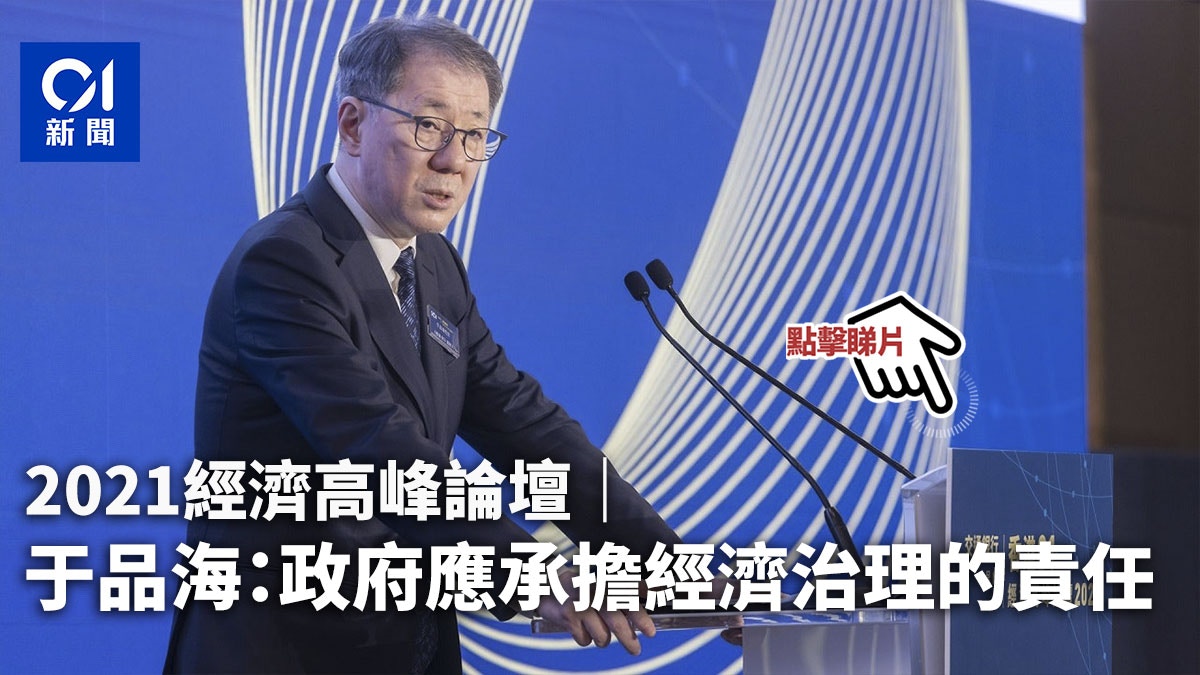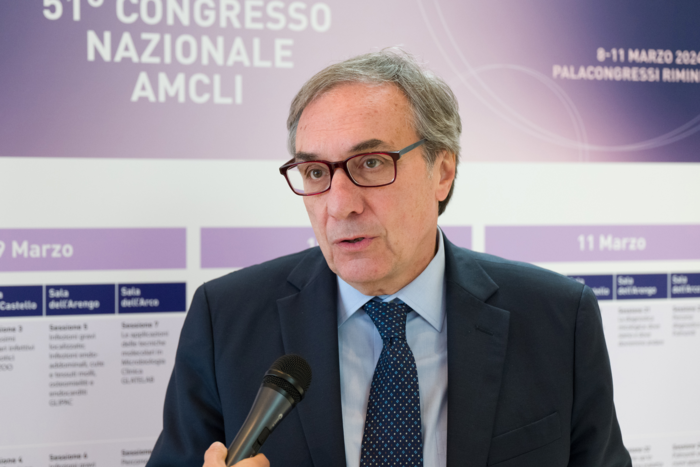[This article is the opening speech of "Hong Kong 01" founder Mr. Yu Pinhai at the "Hong Kong 01 Economic Summit 2021"]
Suddenly, it seems that Hong Kong no longer knows how to manage itself. In the face of countless problems, everyone is helpless and blames each other. The citizens are at a loss as to what to do, and they cannot have a unified understanding of the future.
I always think that social disputes are very out of focus, and the elites who assume leadership responsibilities have not focused on governance.
Whether it’s the health code docking or whether the pilots should be exempted, the development of the "Northern Metropolis" or the reclamation of East Lantau, first customs clearance with the mainland or opening to the world first, if you look at it from the perspective of solving the problem, these should not be a dilemma. issue.
From an academic point of view, the "dilemma" hypothesis hides the attitude of "dual opposition", the belief that things must have both pros and cons, either right or wrong, or good and bad.
Of course there is right and wrong in this world, but can everything be judged by right and wrong?
Is there a right or wrong for citizens to have reasonable living costs and real estate developers to make money?
The pan-people want political reforms, and the establishment of a system requires social stability. Is there a good or bad difference between the two?
The government must have an industrial policy, and the market is more suitable for judging which industry is most in line with economic laws. How can the two understandings be opposed?
The "Hong Kong 01" Economic Summit Forum has the theme of "Restarting, Reshaping, and Fighting a New Game", and invited a number of heavyweight guests to share, to find the way for Hong Kong, which is at the center of change, and seek the development of a new game.
(Photo by Liang Pengwei)
Understanding the rise of China begins with understanding the CCP
After more than ten years of political turmoil, pan-democratic discourses are no longer useful, no one wants to hear meaningless slogans anymore, populist politicians are completely driven out of politics, and petrol bombs should disappear.
The perverse behavior of young people during the riots shocked many people's imaginations, and some people no longer even respect college students.
The establishment has been nicknamed "loyal waste." The business community no longer swaggers in the face of riots and epidemics. Large real estate developers are even worried about whether they will become the target of the next social riots.
All groups are anxious about the changing Hong Kong.
We certainly know that in addition to the reform of the National Security Law and the electoral system, the central government also has requirements in the field of people's livelihood. May I ask, is it possible that the government's proposal of the "Northern Metropolis" has nothing to do with Director Xia Baolong's "Farewell to Subdivided Housing" argument?
The perplexity of Hong Kong people is obvious. The most obvious thing is that people don’t know how to balance between domestic and international, whether to earn US dollars or to earn renminbi, to integrate with the country or to emphasize that they are an "international city", and more importantly, Hong Kong has suddenly become a backward In the economy, poverty seems to be everywhere.
Behind these meaningless confusions, there is actually an interesting phenomenon. Hong Kong people, especially the elite groups, are beginning to want to understand the CCP. This is in sharp contrast to the trough of Hong Kong society’s trust in the government.
It’s not surprising, because apart from Hong Kong, the United States also has the same confusion, whether it’s the BLM movement and the attack on Capitol Hill, the tearing of the left and the right, or the epidemic that killed nearly 800,000 people. Tell us that this veteran superpower has also lost confidence in itself.
They don't want to believe that the problem is their own cause. Instead, they blame China too much. They don't even know that the Chinese economy has helped the United States slow down the pace of decline.
This is not the only similarity between Hong Kong and the United States.
Regarding how to understand the CCP, Hong Kong, like the United States, is aware of its lack of knowledge. Everyone feels that the rise of China has an impact on them. They also know that the CCP is the leader and responsible person for all changes in China, but how to understand the world’s largest Political parties, whether it brings opportunities or threats, some people in Hong Kong and the United States are at a loss as to what to do.
As a special administrative region under the jurisdiction of the Chinese Communist Party, Hong Kong is deeply dependent on the mainland for its economy, closely linked to its daily life, and its defense is maintained by the People's Liberation Army. Of course, China's military influence completely covers its own territory.
These are all obvious facts, but why would anyone worry about the influence of the Mainland on Hong Kong, and even doubt or despise this influence?
As for the United States, if there is no mutual economic dependence, it is indispensable to cooperate with China in international affairs, and China's military power directly coexists with it. Why does it need to have such a great interest in the CCP?
In fact, the only way to understand the rise of China is to start with understanding the CCP, and from its ability in the field of economic governance.
However, many people don't think that the CCP knows how to govern the economy, and even think this is a joke.
I've heard this kind of disdainful evaluation countless times in the past few decades, and then I stopped arguing with them. The so-called "Summer insects can't talk about ice" can only be laughed off.
Many well-known American economists have actually agreed with the CCP’s economic governance capabilities, but they are still unfamiliar with its governance model.
Recently, when the CCP announced its anti-capital "disorderly expansion", it turned out that Buffett and his partner Charlie Munger (Charlie Munger) stood up in the United States.
Eric Schmidt, the former chairman of Google, was the leader of the US government’s entrusted thinking on economic innovation strategies. Not long ago, he reluctantly admitted that the US must consider industrial policy. This is an economic governance method criticized by American economists for decades. Nian also believes that Hong Kong should not adopt such so-called market interference policies.
Emancipate the mind and promote governance reform
The change of attitude is not accidental or piecemeal, but the result of a fundamental change in the consciousness of world economic governance.
To understand the trajectory of the CCP and its economic governance, it can be traced back to the peasant movement in its early years. Many people think that it is just a political and military revolution. In fact, it is a complete reform of the economic structure, and first of all, a change in economic thinking. There is no fundamental difference in the meaning of building a "Northern Metropolis". They are all specific policies for land rights or how to change the interaction between land and economy.
Hong Kong today also needs to emancipate the mind and promote "reform and opening up" with Hong Kong characteristics.
(Photo by Liang Pengwei)
Why Mao Zedong became the supreme leader of the Chinese Communist Party is because he knew the reasons for China’s poverty. His peasant policy not only solved the peasants’ livelihood problems, but also established the CCP’s political status, determined the success of the revolution, and turned China around. The destiny of the country and nation’s economic development.
Why did Deng Xiaoping's reform and opening up succeed? Because it was a change that took place in the rural areas first, and it was the policy of guaranteeing output to households, which gave a successful foundation for more comprehensive economic construction.
A friend expressed concern and asked whether the "Northern Metropolis" was the "land reform"?
I think it is, but it is a big mistake to compare it with the land reform of "dividing local tyrants".
Mr. Li Xiaojia recently proposed "One Hong Kong, Two Systems". I asked him what it was. He believed that Hong Kong should not be tied to its own development by some old administrative habits.
If it is worried that the "Northern Metropolis" initiative will disturb the original governance model, the government can learn from the CCP and use special policies in specific areas, such as Shanghai’s Pudong and Shenzhen’s Qianhai Free Trade Zone to establish targeted "Northern Metropolis". Special policies and even legislation have allowed some problems that were not easy to solve, especially those related to land, to be implemented in the "Northern Metropolis", reducing institutional resistance and accelerating the pace of development.
What Li Xiaojia meant is that Hong Kong can learn from Deng Xiaoping. Don't worry about reforms. If you don't rest assured, narrow the reforms to a smaller scope, try first, and if you succeed, then expand the pilot to a larger area.
When Deng Xiaoping talked about "reform and opening up," he usually emphasized "emancipating the mind" first, because after the Cultural Revolution, everyone didn't dare to imagine how the country should develop, but he believed that he should not be stubborn and stubborn.
This is the reason why China is able to have great tolerance and institutional flexibility today. It also shows that its governance system is scientific and its learning resilience is superb.
The phrase "emancipate the mind" is equally useful to Hong Kong today.
The 18th National Congress of the Communist Party of China is the most important historical turning point in China since the reform and opening up. Xi Jinping put forward the proposal of "modernization of national governance system and governance capabilities" at the Third Plenary Session of the 18th Central Committee. I call it the "fifth modernization." The Eighth National Congress of the Communist Party of China proposed four modernizations-the extension of industry, agriculture, national defense, and science and technology.
The key to the fifth modernization surpassing the first four is "governance", which is not only the governance system, but also the governance capability, and even more modern governance.
From the beginning of the peasant movement and land reform, the CCP has been concerned about China's governance.
There are two levels of "values" and "methodology" in governance. The biggest difference between the Kuomintang and the Communist Party is values, so their "governance" methods are also completely different.
Isn't it the same situation in Hong Kong today?
If promoting the "Northern Metropolitan Area" is only a methodological level, rather than finding a fair and just value proposition for Hong Kong, the "Northern Metropolitan Area" is just a slogan and another real estate project that cannot solve the problem. It is also the same as "Farewell to sub-divided housing." It doesn't matter, Li Xiaojia's "One Hong Kong, Two Systems" is even more playing the piano.
China’s promotion of the construction of Xiongan New Area, Pudong, and Qianhai are all attempts at governance models. The same is true for the Shenzhen Special Economic Zone. "One Country, Two Systems" is an unprecedented governance innovation. The construction of a free trade zone will allow Tesla and other foreign investors to fully open their operations in China. Both are meaningful attempts in the process of exploring governance models.
The construction of a "Northern Metropolis" requires a change in economic thinking.
The picture shows the Hong Kong rural area close to Shenzhen Luohu.
(China News Service)
Governance reform is to satisfy the pursuit of specific values, it is not abstract.
From carrying out land reforms to implementing contracting of production to households, three to one subsidy, then establishing a socialist market economy and scientific development concept, and then to Xi Jinping's promotion of the fifth modernization, supply-side reform, and Made in China 2025, it must continue to pass The improvement and reform of governance have brought China's economy and society to a higher level.
Many Western politicians are saying that they want to do this, but only the CCP has done it, and Hong Kong’s dilemma is: they didn’t even talk about it!
We organize these forums because we hope that everyone will talk more.
The reform that MacLehose promoted in Hong Kong in the 1970s was also a governance reform. It did not change the fundamental system of Hong Kong, but implemented many policy changes within the system.
Therefore, governance changes do not necessarily require changes to the fundamental system, just as "One Country, Two Systems" has not changed China's socialist system. The "One Hong Kong, Two Systems" proposed by Mr. Li Xiaojia should only be understood from the level of governance. The "capitalism with Hong Kong characteristics" proposed in 1988 also means the same thing, hoping that Hong Kong can emancipate its mind and promote "reform and opening up" with Hong Kong characteristics.
+2


/cloudfront-eu-central-1.images.arcpublishing.com/prisa/RBDI3FWLIZDXBFZRE73ADUDT4M.jpg)



/cloudfront-eu-central-1.images.arcpublishing.com/prisa/OOLBKF5K4VFN7EA7IFFA4PMVUE.jpg)




/cloudfront-eu-central-1.images.arcpublishing.com/prisa/KMEYMJKESBAZBE4MRBAM4TGHIQ.jpg)



